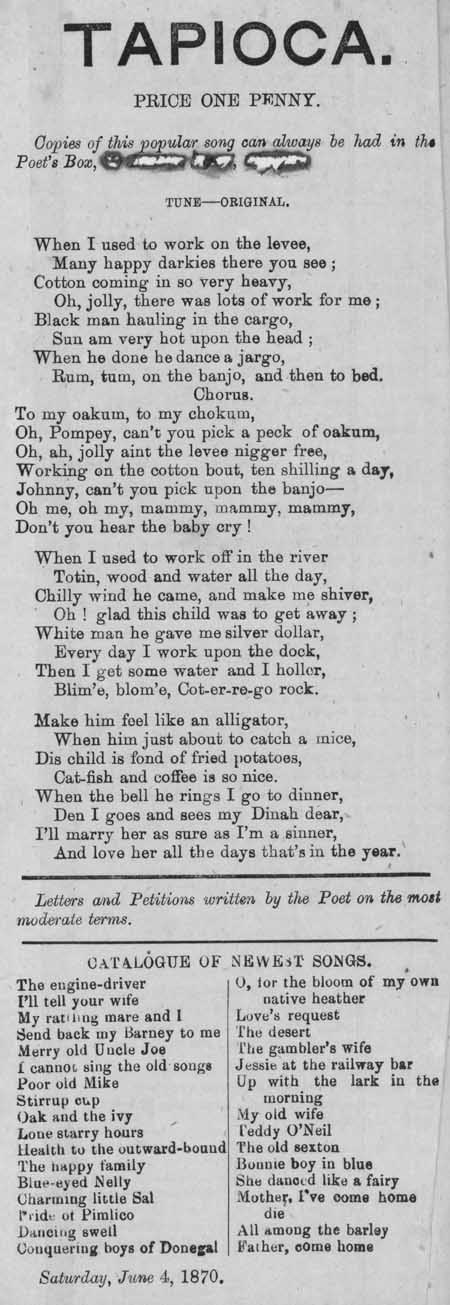Commentary
Verse 1: 'When I used to work on the levee, / many happy darkies there you see; / Cotton coming in so very heavy, / Oh, jolly, there was lots of work for me; / Black man hauling in the cargo, / Sun am very hot upon the head; / When he done he dance a jargo, / Rum, tum on the banjo, and then to bed.' This song was to be sung to an 'Original' tune. The broadside, priced one penny, was published on Saturday, 4th June 1870 by the Poet's Box, probably in Glasgow. This song focuses on African-American slaves and ex-slaves in the United States of America. The black cotton workers are portrayed as fortunate and happy in their work and relaxation. There are even references to them being free, and being paid silver dollars by white men. This suggests that this ballad was written after 1865, when slave-owning was finally abolished in the U.S.A, and that it may be a piece of propaganda praising white magnanimity. In reality, the legacy of slavery was terrible prejudice and poverty, which effectively continued to enslave many African-Americans for years. Racist names in the song indicate reveal the prejudice that still existed.
The Poet?s Box in Glasgow operated from 1849 to 1911. Matthew Leitch was the proprietor at 6 St. Andrew Lane?s, a narrow street on the south side of Gallowgate, from 1850 to 1858. His son William Munsie Leitch worked at the same address from 1859 to 1865 and at varous addresses in London Street until 1911. Many of the broadsides published by the Glasgow Poet?s Box were dated and some carried advertisements, not just for printed items but also for shoe blacking and ?soap for lovers?! Like the other ?boxes? in Dundee and Edinburgh, the Glasgow one sold love songs, sea shanties, parodies and dialogues. It is not clear what the connection between the different Poet?s Boxes were. They almost certainly sold each other?s sheets. It is known that John Sanderson in Edinburgh often wrote to the Leitches in Glasgow for songs and that later his brother Charles obtained copies of songs from the Dundee Poet?s Box. There was also a Poet?s Box in Belfast from 1846 to 1856 at the address of the printer James Moore, and one in Paisley in the early 1850s owned by William Anderson.
Early ballads were dramatic or humorous narrative songs derived from folk culture that predated printing. Originally perpetuated by word of mouth, many ballads survive because they were recorded on broadsides. Musical notation was rarely printed, as tunes were usually established favourites. The term 'ballad' eventually applied more broadly to any kind of topical or popular verse.
View Transcription | Download PDF Facsimile
|
 |
Date of publication:
1865-1870 shelfmark: L.C.1269(160b)
 View larger image
View larger image
|


